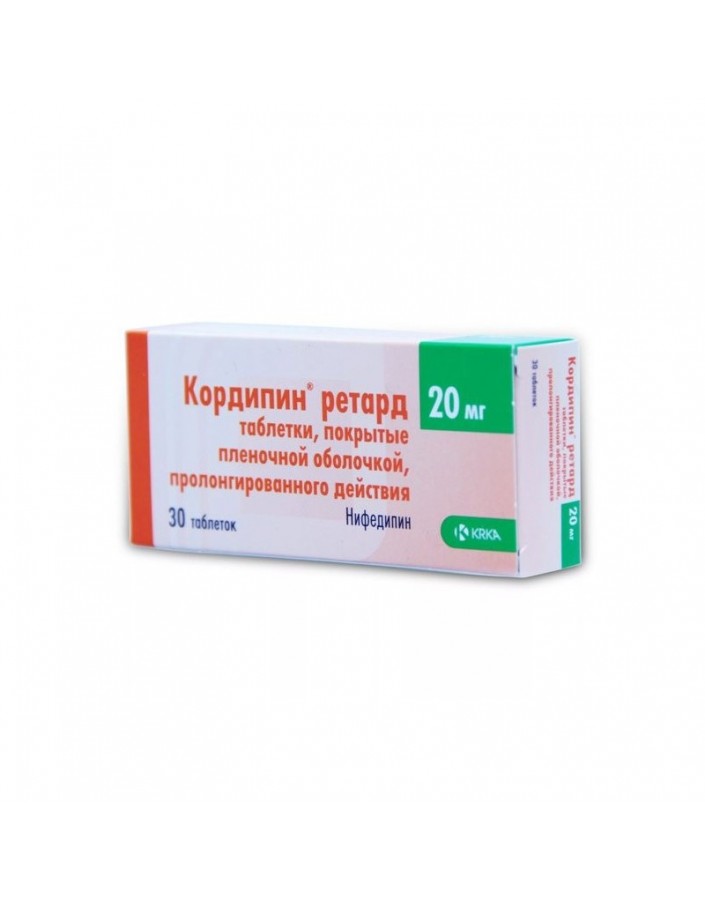




Security policy (edit with Customer reassurance module)

Delivery policy (edit with Customer reassurance module)

Return policy (edit with Customer reassurance module)
Mechanism of actionAntianginal, hypotensive. It blocks Calcium channels, inhibits transmembrane entry of calcium ions into the smooth muscle cells of the arterial vessels and cardiomyocytes. Expands peripheral, mainly arterial, vessels, incl. coronary, lowers blood pressure (possible slight reflex tachycardia and an increase in cardiac output), reduces round coronary tract and afterload on the heart. Increases coronary blood flow, reduces the strength of heart contractions, heart work and the need of myocardium for oxygen. It improves myocardial function and helps to reduce the size of the heart in chronic heart failure. Lowers pressure in the pulmonary artery, has a positive effect on cerebral hemodynamics. It inhibits platelet aggregation, has anti-atherogenic properties (especially with long-term use), improves post-stenotic circulation in atherosclerosis. Increases the excretion of sodium and water, lowers the tone of the myometrium (tocolytic action). Prolonged reception (2-3 months) is accompanied by the development of tolerance. For long-term therapy of arterial hypertension, fast-acting dosage forms should be used in a dose of up to 40 mg / day (with an increase in dose, the development of concomitant reflex reactions is more likely).In patients with asthma, it can be used with other bronchodilators (sympathomimetics) for maintenance treatment. Indications and usageArterial hypertension, including hypertensive crisis, prevention of angina attacks (including Prinzmetal angina), hypertrophic cardiomyopathy (obstructive, etc.), Raynaud's disease, pulmonary hypertension, bronchoobstructive syndrome. The dose of the drug is selected individually depending on the patient's condition and sensitivity to the drug. Usually prescribed 20 mg 2 times a day. With insufficient severity of effect, the dose of the drug should be increased to 40 mg 2 times a day. ContraindicationsHypersensitivity, acute myocardial infarction (first 8 days), cardiogenic shock, severe aortic stenosis, heart failure in the decompensation stage, severe arterial hypotension, tachycardia, pregnancy, breast-feeding. Pregnancy and breastfeedingContraindicated. At the time of treatment should stop breastfeeding. Special notesIt should refrain from the use of the drug in pediatric practice, since the safety and efficacy of its use in children have not been determined. Elderly patients are advised to reduce the daily dose (lower metabolism). Use with caution while working drivers of vehicles and people whose profession is associated with increased concentration of attention. Cancel the drug should be gradually (possibly the development of withdrawal syndrome). In patients with stable angina at the beginning of treatment, there can be a paradoxical increase in angina pain, with severe coronary sclerosis and unstable angina - aggravation of myocardial ischemia. It is not recommended to use short-acting drugs for long-term treatment of angina or arterial hypertension, because possible development of unpredictable changes in blood pressure and reflex angina. Drug InteractionsNitrates, beta-blockers, diuretics, tricyclic antidepressants, fentanyl, alcohol - increase the hypotensive effect. Increases theophylline activity, reduces the renal clearance of Digoxin. Strengthens the side effects of vincristine (reduces excretion). Increases the bioavailability of cephalosporins (cefixime). Cimetidine and Ranitidine increase plasma levels. Diltiazem slows down the metabolism (requires a reduction in the dose of nifedipine). Incompatible with rifampicin (accelerates biotransformation and does not allow for the creation of effective concentrations). Grapefruit juice (large amounts) increases bioavailability. |